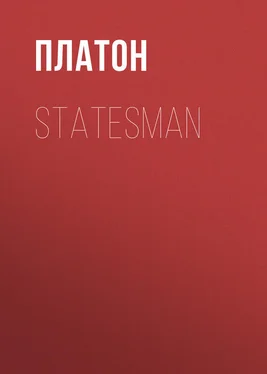Платон - Statesman
Здесь есть возможность читать онлайн «Платон - Statesman» — ознакомительный отрывок электронной книги совершенно бесплатно, а после прочтения отрывка купить полную версию. В некоторых случаях можно слушать аудио, скачать через торрент в формате fb2 и присутствует краткое содержание. Жанр: Философия, foreign_antique, foreign_prose, на английском языке. Описание произведения, (предисловие) а так же отзывы посетителей доступны на портале библиотеки ЛибКат.
- Название:Statesman
- Автор:
- Жанр:
- Год:неизвестен
- ISBN:нет данных
- Рейтинг книги:5 / 5. Голосов: 1
-
Избранное:Добавить в избранное
- Отзывы:
-
Ваша оценка:
- 100
- 1
- 2
- 3
- 4
- 5
Statesman: краткое содержание, описание и аннотация
Предлагаем к чтению аннотацию, описание, краткое содержание или предисловие (зависит от того, что написал сам автор книги «Statesman»). Если вы не нашли необходимую информацию о книге — напишите в комментариях, мы постараемся отыскать её.
Statesman — читать онлайн ознакомительный отрывок
Ниже представлен текст книги, разбитый по страницам. Система сохранения места последней прочитанной страницы, позволяет с удобством читать онлайн бесплатно книгу «Statesman», без необходимости каждый раз заново искать на чём Вы остановились. Поставьте закладку, и сможете в любой момент перейти на страницу, на которой закончили чтение.
Интервал:
Закладка:
The myth, like that of the Timaeus and Critias, is rather historical than poetical, in this respect corresponding to the general change in the later writings of Plato, when compared with the earlier ones. It is hardly a myth in the sense in which the term might be applied to the myth of the Phaedrus, the Republic, the Phaedo, or the Gorgias, but may be more aptly compared with the didactic tale in which Protagoras describes the fortunes of primitive man, or with the description of the gradual rise of a new society in the Third Book of the Laws. Some discrepancies may be observed between the mythology of the Statesman and the Timaeus, and between the Timaeus and the Republic. But there is no reason to expect that all Plato's visions of a former, any more than of a future, state of existence, should conform exactly to the same pattern. We do not find perfect consistency in his philosophy; and still less have we any right to demand this of him in his use of mythology and figures of speech. And we observe that while employing all the resources of a writer of fiction to give credibility to his tales, he is not disposed to insist upon their literal truth. Rather, as in the Phaedo, he says, 'Something of the kind is true;' or, as in the Gorgias, 'This you will think to be an old wife's tale, but you can think of nothing truer;' or, as in the Statesman, he describes his work as a 'mass of mythology,' which was introduced in order to teach certain lessons; or, as in the Phaedrus, he secretly laughs at such stories while refusing to disturb the popular belief in them.
The greater interest of the myth consists in the philosophical lessons which Plato presents to us in this veiled form. Here, as in the tale of Er, the son of Armenius, he touches upon the question of freedom and necessity, both in relation to God and nature. For at first the universe is governed by the immediate providence of God, – this is the golden age, – but after a while the wheel is reversed, and man is left to himself. Like other theologians and philosophers, Plato relegates his explanation of the problem to a transcendental world; he speaks of what in modern language might be termed 'impossibilities in the nature of things,' hindering God from continuing immanent in the world. But there is some inconsistency; for the 'letting go' is spoken of as a divine act, and is at the same time attributed to the necessary imperfection of matter; there is also a numerical necessity for the successive births of souls. At first, man and the world retain their divine instincts, but gradually degenerate. As in the Book of Genesis, the first fall of man is succeeded by a second; the misery and wickedness of the world increase continually. The reason of this further decline is supposed to be the disorganisation of matter: the latent seeds of a former chaos are disengaged, and envelope all things. The condition of man becomes more and more miserable; he is perpetually waging an unequal warfare with the beasts. At length he obtains such a measure of education and help as is necessary for his existence. Though deprived of God's help, he is not left wholly destitute; he has received from Athene and Hephaestus a knowledge of the arts; other gods give him seeds and plants; and out of these human life is reconstructed. He now eats bread in the sweat of his brow, and has dominion over the animals, subjected to the conditions of his nature, and yet able to cope with them by divine help. Thus Plato may be said to represent in a figure – (1) the state of innocence; (2) the fall of man; (3) the still deeper decline into barbarism; (4) the restoration of man by the partial interference of God, and the natural growth of the arts and of civilised society. Two lesser features of this description should not pass unnoticed: – (1) the primitive men are supposed to be created out of the earth, and not after the ordinary manner of human generation – half the causes of moral evil are in this way removed; (2) the arts are attributed to a divine revelation: and so the greatest difficulty in the history of pre-historic man is solved. Though no one knew better than Plato that the introduction of the gods is not a reason, but an excuse for not giving a reason (Cratylus), yet, considering that more than two thousand years later mankind are still discussing these problems, we may be satisfied to find in Plato a statement of the difficulties which arise in conceiving the relation of man to God and nature, without expecting to obtain from him a solution of them. In such a tale, as in the Phaedrus, various aspects of the Ideas were doubtless indicated to Plato's own mind, as the corresponding theological problems are to us. The immanence of things in the Ideas, or the partial separation of them, and the self-motion of the supreme Idea, are probably the forms in which he would have interpreted his own parable.
Конец ознакомительного фрагмента.
Текст предоставлен ООО «ЛитРес».
Прочитайте эту книгу целиком, купив полную легальную версию на ЛитРес.
Безопасно оплатить книгу можно банковской картой Visa, MasterCard, Maestro, со счета мобильного телефона, с платежного терминала, в салоне МТС или Связной, через PayPal, WebMoney, Яндекс.Деньги, QIWI Кошелек, бонусными картами или другим удобным Вам способом.
Интервал:
Закладка:
Похожие книги на «Statesman»
Представляем Вашему вниманию похожие книги на «Statesman» списком для выбора. Мы отобрали схожую по названию и смыслу литературу в надежде предоставить читателям больше вариантов отыскать новые, интересные, ещё непрочитанные произведения.
Обсуждение, отзывы о книге «Statesman» и просто собственные мнения читателей. Оставьте ваши комментарии, напишите, что Вы думаете о произведении, его смысле или главных героях. Укажите что конкретно понравилось, а что нет, и почему Вы так считаете.










